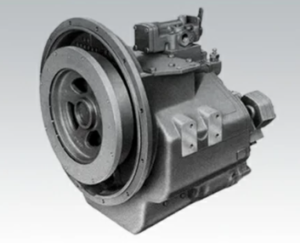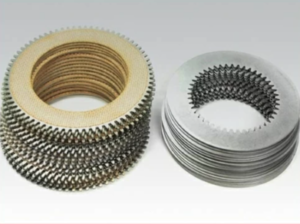April 3, 2025
Overview of Twin Disc MG-5091 Marine Transmission General Specifications Key Design Features Applications in Marine Operations Importance of Preventive Maintenance and Proper Repair Practices Why Preventive Maintenance Matters The Risks of Neglect Common Service Intervals Repair Best Practices Use of Premium Aftermarket Parts to Reduce Downtime Why Choose Premium Aftermarket Over OEM Parts You Should Always Replace During Overhaul What to Look For in a Quality Aftermarket Kit Additional Tips to Avoid Downtime Disclaimer: Refer to OEM Service Manual (SM-259) for Full Technical Specs Summary and Final Notes Videos About Twin Disc Transmissions Read More
April 3, 2025
Gearbox Specifications for Twin Disc MG-5091 Marine Gear Serial Number Identification for Twin Disc MG-5091 Marine Gear Personal Protective Equipment (PPE) for Twin Disc MG-5091 Marine Gear Safe Maintenance Practices for Twin Disc MG-5091 Marine Gear Pre-Installation Inspection for Twin Disc MG-5091 Marine Gear Alignment and Mounting for Twin Disc MG-5091 Marine Gear Startup Checklist for Twin Disc MG-5091 Marine Gear Operating Parameters for Twin Disc MG-5091 Marine Gear Approved Oil Types for Twin Disc MG-5091 Marine Gear Oil Change Intervals for Twin Disc MG-5091 Marine Gear Oil Filter Maintenance for Twin Disc MG-5091 Marine Gear Daily Checks for Twin Disc MG-5091 Marine Gear Weekly Tasks for Twin Disc MG-5091 Marine Gear Monthly/Quarterly Tasks for Twin Disc MG-5091 Marine Gear Common Symptoms and Probable Causes for Twin Disc MG-5091 Marine Gear Diagnostic Tips for Twin Disc MG-5091 Marine Gear Tools Required for Twin Disc MG-5091 Marine Gear Disassembly Tips for Twin Disc MG-5091 Marine Gear Inspection Points for Twin Disc MG-5091 Marine Gear Cleaning and Preparation for Twin Disc MG-5091 Marine Gear Gasket and Seal Installation for Twin Disc MG-5091 Marine Gear Final Assembly and Testing for Twin Disc MG-5091 Marine Gear Commonly Replaced Components for Twin Disc MG-5091 Marine Gear Rebuild Kit Options for Twin Disc MG-5091 Marine Gear Torque Settings for Twin Disc MG-5091 Marine Gear Tolerances for Twin Disc MG-5091 Marine Gear Long-Term Storage for Twin Disc MG-5091 Marine Gear Seasonal Layup for Twin Disc MG-5091 Marine Gear Videos About Twin Disc Transmissions Read More
April 3, 2025
General Overview FAQs For Twin Disc MG-5090A Marine Gear Compatibility & Sizing FAQs For Twin Disc MG-5090A Marine Gear Oil, Fluids & Filters FAQs For Twin Disc MG-5090A Marine Gear Performance & Troubleshooting FAQs For Twin Disc MG-5090A Marine Gear Installation & Alignment FAQs For Twin Disc MG-5090A Marine Gear Clutch & Hydraulic System FAQs For Twin Disc MG-5090A Marine Gear Controls & Linkages FAQs For Twin Disc MG-5090A Marine Gear Maintenance & Lifecycle FAQs For Twin Disc MG-5090A Marine Gear Purchasing & Support FAQs For Twin Disc MG-5090A Marine Gear Videos About Twin Disc Transmissions Read More
April 3, 2025
Maintain a Log of Service Intervals and Parts Replaced Recommended log entries: Always Use Premium Aftermarket Parts From Reliable Suppliers Such as Diesel Pro Power If Your MG-5090A Transmission Has Undergone Repeated Clutch Replacements, Inspect Engine Alignment and Propeller Loading—Issues Upstream Can Cause Premature Wear 1. Engine Alignment: 2. Propeller Load Mismatch: 3. Control System Lag or Incorrect Shifting: Do Not Delay Oil Changes; Dirty or Degraded Oil Is the #1 Killer of Marine Gear Life How often should you change the oil? For Harsh Environments or Commercial Vessels Running Over 1,000 Hours Per Year, Shorten Your Oil and Filter Intervals Accordingly Examples of harsh duty environments: Additional Final Service Considerations For Twin Disc MG-5090A Marine Gear 1. Winterization and Long-Term Storage 2. Start-Up After Lay-Up 3. Emergency Spare Kits 4. Training for Crew 5. Data Plate Reference Summary of Best Practices For Twin Disc MG-5090A Marine Gear Need Help With Your MG-5090A Transmission? Videos About Twin Disc Transmissions Read More
April 3, 2025
Introduction: Diagnosing Problems in the MG-5090A Marine Transmission 1. Slipping in Gear Possible Causes: Diagnostic Steps: Corrective Actions: 2. Harsh or Jerky Shifting Possible Causes: Diagnostic Steps: Corrective Actions: 3. No Response When Shifted into Gear Possible Causes: Diagnostic Steps: Corrective Actions: 4. Noise Under Load Possible Causes: Diagnostic Steps: Corrective Actions: 5. Overheating Transmission Possible Causes: Diagnostic Steps: Corrective Actions: Additional Issues and Corrective Actions 6. Leaking Seals or Gaskets 7. Transmission Stuck in Gear 8. Shudder on Engagement 9. Noisy Start-Up After Rebuild 10. Control Lever Feels Loose or Slack Preventive Maintenance to Avoid Common Problems Routine Checks: Tips to Prevent Failures: When to Replace Instead of Repair Summary: Identify Symptoms Early to Keep Your MG-5090A in Top Shape Troubleshooting Summary Table Symptom Possible Cause Corrective Action Videos About Twin Disc Transmissions Read More
April 3, 2025
Introduction: The Importance of Proper Reassembly for MG-5090A Reliability Preparation Before Starting Reassembly Clean Workspace Verify Replacement Parts Gather Required Tools Step-by-Step Reassembly Procedure Step 1: Lubricate Bearings and Shafts Step 2: Install Bearings and Seals Step 3: Assemble Gears and Shafts Step 4: Reinstall Clutch Packs Step 5: Replace All Gaskets and Sealing Surfaces Step 6: Torque All Bolts to OEM Specifications Recommended Torque Procedure: Post-Reassembly Testing and Verification Step 1: Fill With Approved Oil Step 2: Manual Gear Test (Pre-Start) Step 3: Start Engine and Run in Neutral Step 4: Recheck Bolt Torque and Oil Level Step 5: Run Under Load (Dock Test) Step 6: Recheck Clutch Pressure and Performance Troubleshooting Reassembly Mistakes Slipping or Delayed Engagement Whining or Vibration Oil Leaks No Engagement Pro Tips for Success When to Rebuild vs. Replace Diesel Pro Power Offers: Summary: Precision Reassembly Equals Peak Performance Reassembly Quick Reference Table Step Key Action Tools Required Videos About Twin Disc Transmissions Read More




 Free US Calls: 1-888-433-4735
Free US Calls: 1-888-433-4735 International: 305-545-5588
International: 305-545-5588
